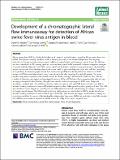Por favor, use este identificador para citar o enlazar a este item:
http://hdl.handle.net/10261/296520COMPARTIR / EXPORTAR:
 SHARE SHARE
 CORE
BASE CORE
BASE
|
|
| Visualizar otros formatos: MARC | Dublin Core | RDF | ORE | MODS | METS | DIDL | DATACITE | |

| Título: | Development of a chromatographic lateral flow immunoassay for detection of African swine fever virus antigen in blood |
Autor: | Madden, Daniel W.; Sunwoo, Sun Young; Gaudreault, Natasha N.; Trujillo, Jessie D.; Morozov, Igor; Gallardo, Carmina; Richt, Jürgen A. | Palabras clave: | African swine fever Lateral flow immunoassay Point of care diagnostics |
Fecha de publicación: | 21-jun-2022 | Editor: | BioMed Central | Citación: | Animal Diseases 2(1): e14 (2022) | Resumen: | African swine fever (ASF) is a highly lethal disease of domestic and wild swine caused by African swine fever virus (ASFV). The disease currently circulates in Africa, Europe, Asia and on the island of Hispaniola. The ongoing epizootics in Europe and Asia have produced millions of animal deaths and severe economic losses. No effective vaccine is available for ASF, making rapid and accurate detection of ASFV essential for disease mitigation strategies. Currently available diagnostics for ASFV possess significant limitations related to assay performance, deployability, and/or turn-around time; therefore there is an unmet need for pen-side diagnostic tests with sufficient sensitivity and specificity. A chromatographic lateral flow immunoassay (LFIA) was developed for the detection of ASFV antigen in EDTA-treated whole blood using monoclonal antibodies targeting the viral p30 protein. The assay requires only water to perform and provides results in 25 min, making it well-suited for field use. The LFIA was capable of detecting genotype I and genotype II strains of ASFV in EDTA blood from experimentally infected pigs at varying time-points after infection, though it was unable to detect a genotype X ASFV strain. Diagnostic sensitivity correlated with clinical disease severity, body temperature, and viral DNA levels, and was over 90% in animals showing moderate to severe ASF-related symptoms after challenge with virulent genotype II virus. The LFIA also showed a robust diagnostic specificity of over 98%, which is essential to field testing for a high consequence to foregin animal disease. The LFIA targeting the viral p30 protein can reliably detect ASFV in whole blood from animals showing moderate to severe clinical signs of infection with virulent genotype I and II isolates, making it a promising candidate for use as a field-deployable antigen detection assay. Additional evaluation using field samples and different virus strains is required to further assess the utility of this rapid diagnostic test. | Descripción: | 15 Pág. Centro de Investigación en Sanidad Animal (CISA) | Versión del editor: | https://doi.org/10.1186/s44149-022-00045-9 | URI: | http://hdl.handle.net/10261/296520 | DOI: | 10.1186/s44149-022-00045-9 | ISSN: | 2731-0442 |
| Aparece en las colecciones: | (INIA) Artículos |
Ficheros en este ítem:
| Fichero | Descripción | Tamaño | Formato | |
|---|---|---|---|---|
| Development-of-a-chromatographic-lateral-flow.pdf | artículo | 1,22 MB | Adobe PDF |  Visualizar/Abrir |
CORE Recommender
SCOPUSTM
Citations
2
checked on 21-may-2024
Page view(s)
52
checked on 22-may-2024
Download(s)
23
checked on 22-may-2024
Google ScholarTM
Check
Altmetric
Altmetric
Este item está licenciado bajo una Licencia Creative Commons

